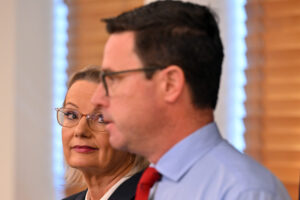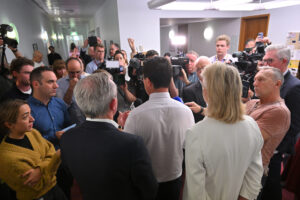The National party represents many electorates which have high rates of unemployment and people receiving government support payments, and a high proportion of workers on the minimum wage. So you can see why they spend so much time attacking industrial laws, renewable energy and “urban elites” – creating blame is a lot easier than creating regional jobs.
Over the summer, Australia’s deputy prime minister Michael McCormack, actually blamed the viewing habits of city residents for the lack of fruit pickers in regional Australia, declaring: “I say to those people who perhaps have done reasonably well off jobseeker, who may have earned more than they could have dreamt of, it is perhaps to turn the Stan and Netflix off to come to the regions [where] you can have a better life.”
His comments provide a clear example of the cynical political strategy the Nationals have developed as a substitute for an effective regional development strategy.
The second problem with the National’s strategy of blaming success in our cities for their failures in the bush is that if anyone in the cities actually took the deputy PM’s advice, they would simultaneously harm themselves and harm the regional unemployed. According to Services Australia, another of the government’s own websites, a person on jobseeker who moves from an area of low unemployment (like Sydney) to a region of high unemployment (like most National party electorates) can have their unemployment payments suspended for up to 26 weeks. And surely McCormack can see that if a binge-watching Sydneysider moves to regional Australia to pick fruit, they would be taking a job from one of the unemployed people in a regional electorate.
The third problem is by far the biggest. McCormack’s rhetoric is a deliberate strategy to direct attention away from the responsibility of his government to implement effective macroeconomic and regional development policies.
The surge in unemployment following Covid-19 was not caused by a surge in laziness, apathy or a desire to binge television series. The surge in unemployment across Australia and in some parts of regional Australia was caused by a lack of customers, a lack of inbound visitors and a lack of well-targeted government stimulus spending.
For decades the junior Coalition partner has played along with the idea that cutting tax rates and government payments and keeping the minimum wage down would “create jobs and growth”. The price for playing along was that there were always slush funds to ensure lots of ribbon-cutting opportunities for National party MPs to take a bow at. But as the government’s own data makes clear, while this might be a good strategy for getting in local news media it is entirely ineffective at boosting regional economies.
The elephant in the room is that the foundation of the economy in National party seats is the health sector and the income support paid to the elderly, the disabled and the unemployed. Put simply, cuts to public spending and government support hit the National seats hardest.
There’s no electorate in Australia where the coalmining industry employs more people than the health and community services sector. None. But when was the last time you heard a National party MP opposing tax cuts for those in the top tax bracket (only a tiny percentage of whom live in regional Australia) and calling for a big increase in spending on public health?
The National’s support for the Liberal’s proposed changes to the industrial relations (IR) laws are similarly confused. Workers in regional areas are more likely to be on the minimum wage and more likely to be harmed by the removal of the “better off overall test” which, as the name suggests, requires any new enterprise agreement to make workers better off, relative to the minimum wage and conditions guaranteed by the modern awards. The only reason to remove this obligation is if you plan to draw up new agreements that make employees worse off, and again, such workers are more likely to be found in regional Australia.
Victim-blaming is a tried and true strategy for winning votes in Australia, but there is no evidence of it ever creating any jobs.
If regional Australians better understood how few of them owed their jobs to the coal industry, how many of them owed their lives and livelihoods to the public health system, and how many jobs there could be from renewable energy, regional tourism and world-class public services, then Australian politics would be turned on its head. And with their Coalition partners busy trying to further weaken IR laws in Australia, don’t expect the blame-shifting and BS about “urban elites” from the Nationals to stop any time soon.
Richard Denniss is the chief economist at the independent thinktank, the Australia Institute @RDNS_TAI
Between the Lines Newsletter
The biggest stories and the best analysis from the team at the Australia Institute, delivered to your inbox every fortnight.
You might also like
Gender parity closer after federal election but “sufficiently assertive” Liberal women are still outnumbered two to one
Now that the dust has settled on the 2025 federal election, what does it mean for the representation of women in Australian parliaments? In short, there has been a significant improvement at the national level. When we last wrote on this topic, the Australian Senate was majority female but only 40% of House of Representatives
Hearing voices: why the Nats should be watching their backs
The community independent movement did not begin in Sydney or Melbourne, but in the bush.
The election exposed weaknesses in Australian democracy – but the next parliament can fix them
Australia has some very strong democratic institutions – like an independent electoral commission, Saturday voting, full preferential voting and compulsory voting. These ensure that elections are free from corruption; that electorate boundaries are not based on partisan bias; and that most Australians turn out to vote. They are evidence of Australia’s proud history as an


